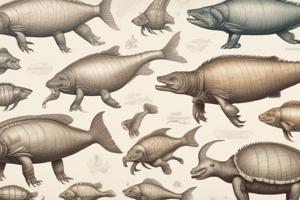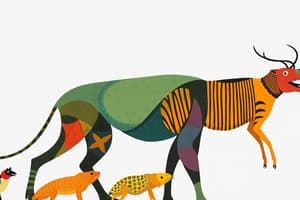Podcast
Questions and Answers
What are common characteristics of the members of the Kingdom Animalia?
What are common characteristics of the members of the Kingdom Animalia?
Animals are multicellular eukaryotes with specialized cells for functions such as digestion, reproduction, vision, and taste. They have collagen that surrounds cells to maintain shape, get energy by eating other organisms, and digest food.
What is an animal with a backbone called?
What is an animal with a backbone called?
vertebrate
What is an animal without a backbone called?
What is an animal without a backbone called?
invertebrate
What makes up most of the animal kingdom?
What makes up most of the animal kingdom?
What is another step you could take to classify an animal?
What is another step you could take to classify an animal?
What describes an animal's body plan?
What describes an animal's body plan?
When can an animal be divided into two parts that are nearly mirror images of each other anywhere through a central axis, what is this called?
When can an animal be divided into two parts that are nearly mirror images of each other anywhere through a central axis, what is this called?
When an animal can be divided into two parts that are nearly mirror images of each other, what is this called?
When an animal can be divided into two parts that are nearly mirror images of each other, what is this called?
What is a third step you can take in order to classify an animal?
What is a third step you can take in order to classify an animal?
What do scientists use to classify the members of the animal kingdom?
What do scientists use to classify the members of the animal kingdom?
What is the one phylum that includes vertebrates?
What is the one phylum that includes vertebrates?
What are the nine major phyla in the Animal Kingdom?
What are the nine major phyla in the Animal Kingdom?
Flashcards are hidden until you start studying
Study Notes
Definition of Animals
- Members of the Kingdom Animalia are multicellular, eukaryotic organisms.
- Animals possess specialized cells that perform distinct functions such as digestion, reproduction, vision, and taste.
- Collagen, a structural protein, surrounds animal cells, maintaining their shape.
- Energy is obtained by consuming other organisms, and animals undergo digestion to process their food.
Classification: Vertebrates and Invertebrates
- Vertebrates are animals with a backbone.
- Invertebrates, which do not have a backbone, constitute the majority of the animal kingdom.
Body Symmetry in Animals
- Symmetry describes an animal's body plan, which is crucial for classification.
- Radial symmetry allows an animal to be divided into two nearly identical parts through multiple planes along a central axis.
- Bilateral symmetry permits division into two symmetrical halves only through one specific plane.
Classification Techniques
- Additional methods for animal classification include assessing body symmetry and molecular classification by comparing DNA to ascertain relatedness.
- The animal kingdom comprises approximately 35 distinct phyla.
Major Animal Phyla
- Echinodermata: Includes sea stars, characterized by radial symmetry.
- Chordata: Encompasses vertebrates like sea urchins and sea cucumbers.
- Arthropoda: Consists of insects, spiders, shrimp, and crabs, known for their exoskeletons.
- Annelida: Comprises earthworms, leeches, and marine worms, featuring segmented bodies.
- Mollusca: Includes snails, slugs, clams, mussels, octopuses, and squids, which typically have soft bodies and some form of shell.
- Nematoda: Known as roundworms, which are unsegmented and cylindrical.
- Platyhelminthes: Refers to flatworms, including planarians and tapeworms.
- Cnidaria: Consists of jellyfish, sea anemones, and corals, known for stinging cells.
- Porifera: The sponges are recognized for their porous bodies and lack of true tissues.
Studying That Suits You
Use AI to generate personalized quizzes and flashcards to suit your learning preferences.




